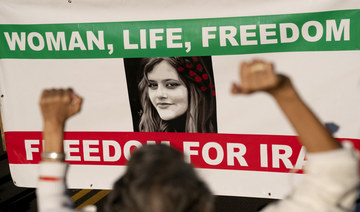BERLIN: Two Iranian directors said they have been barred from traveling to the Berlin film festival for their new movie’s premiere Friday for breaking one of their country’s biggest taboos: showing a woman pursuing a “normal life.”
Maryam Moghaddam and Behtash Sanaeeha told AFP from Tehran that they knew they were playing with fire with “My Favourite Cake,” one of 20 films vying for the Golden Bear top prize.
Nevertheless, the crackdown came as a shock last autumn.
“They raided our editor’s place and took all the hard drives and computers of the project,” Sanaeeha, 43, said by video link.
“Then when we wanted to leave Tehran to go to Paris to finish the post-production, at the airport they took our passports.”
Moghaddam, 52, said their crime was, with the film, “crossing so many red lines which have been forbidden in Iran for 45 years.”
“It’s about the woman living her life, who wants to have a normal life, which is forbidden for women in Iran.”
The bittersweet story spotlights 70-year-old Mahin, a retired nurse played by acclaimed culture journalist Lily Farhadpour.
After three decades on her own following her husband’s death, Mahin finds a man who catches her fancy while they are both dining alone at a pensioners’ restaurant.
They strike up a friendly rapport and are soon recalling their more permissive youth — before the 1979 Islamic Revolution — when drinking, dancing and “plunging necklines” were part of city life.
Mahin invites Faramarz to her home and, dodging the prying eyes of her neighbors, removes her hijab, pours two tall glasses of wine and pulls out her beloved “oldies” CDs.
“Showing a woman without her hijab is forbidden. But most women, even religious women, are without hijab at home,” Moghaddam said.
“Drinking alcohol or dancing or meeting a partner — everything happens in Iran, but inside the walls because it’s forbidden outside. We wanted to be dedicated to reality and show it.”
The scenes mark “a new thing for Iranian cinema,” she said, holding up a “mirror” to a way of life many still long for.
Sanaeeha noted that the case of Mahsa Amini, the young Iranian-Kurdish woman whose custody death sparked months of anti-government protests, came while the film was already in pre-production.
“We were depressed about the situation happening in our country,” Sanaeeha said.
“But we talked, all the crew, and we explained (to) them what we are doing in this film — it’s about women, it’s about life and it’s about freedom. So it was our duty to finish this film.”
In a harrowing scene, Mahin confronts officers from the Morality Police arresting young women for not properly covering their hair — the same offense that put Amini in their crosshairs.
“You’d kill her over a few strands of hair,” Mahin screams.
The late-in-life love story of Mahin and Faramarz feels revolutionary as they escape their deeply conservative society’s strictures — at least for one night.
“We wanted to tell a deeper story about life, about seizing the moment,” Moghaddam said.
The Berlin film festival, which has long championed Iran’s embattled directors, urged authorities to allow the filmmakers to travel. As has become customary, it will leave two seats empty for them at the premiere.
Farhadpour held up a picture of the two directors after a warmly received press preview and condemned their absence in Berlin.
“This is an absolutely impossible way of behaving on the part of the Iranian government,” she said.
Moghaddam and Sanaeeha’s previous film “Ballad of a White Cow,” a drama about the death penalty, premiered at the 2021 Berlinale, as the event is known.
They said it has since been banned in Iran but is available for downloads on European and US platforms.
“With the Internet, you cannot censor the art so the film will come out” at home and abroad, Sanaeeh said.
However, the stakes for independent filmmakers remain daunting.
“You have to risk your career, your income, your everything,” Moghaddam said.























